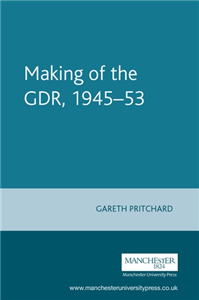Making of the GDR, 1945–53
by Gareth Pritchard
'Pritchard masterfully interweaves materials from professional journals, memoirs, interview protocols, diaries, Eastern and Western historical interpretations, as well as a wide range of state and party archives. The result is an impressive and important achievement that belongs on the shelf of anyone interested in the foundation period of East European Communist regimes.' American Historical Review The making of the GDR 1945-53 is a groundbreaking analysis of the Stalinisation of East Germany. Whereas most traditional accounts have explained the creation of the GDR in terms of high politics and of Soviet foreign policy, this book focuses on the social roots of the emerging dictatorship. These were located above all in the traditions of the German labour movement and the history of the anti-Nazi resistance. The GDR was not imposed on the East German people at the point of Russian bayonets; it emerged out of the interaction between Soviet occupation policy and the politics of the East German working class. The making of the GDR 1945-53 also tells a powerful human story, in which the aspirations of antifascists and Socialists were manipulated and ultimately betrayed by Stalinism. Based on extensive research, this book will be of interest to those concerned with the division of Germany, the nature of the GDR, and the whole trajectory of post-war German politics. ;










